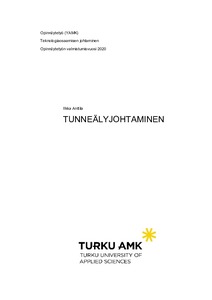Tunneälyjohtaminen
Anttila, Ilkka (2020)
Anttila, Ilkka
2020
All rights reserved. This publication is copyrighted. You may download, display and print it for Your own personal use. Commercial use is prohibited.
Julkaisun pysyvä osoite on
https://urn.fi/URN:NBN:fi:amk-2020122830015
https://urn.fi/URN:NBN:fi:amk-2020122830015
Tiivistelmä
Tämä YAMK opinnäytetyö on kvalitatiivinen ja aineistolähtöinen työ tunneälyn, sosiaalisen älyn ja tunneälyjohtamisen tärkeydestä sekä merkityksestä työelämässä. Tarkoitus on tuoda esille tunteiden merkitys niin yksilön kuin organisaation näkökulmasta ja korostaa tunteiden merkitystä työelämässä menestymisen taustalla. Lisäksi tavoitteena on osoittaa, kuinka tunneilmapiiriä voidaan mitata organisaatiossa tunneälyjohtamisen tueksi.
Teoriaosuus on toteutettu aineisto- ja kirjallisuuskatsauksena, jonka avulla on perehdytty niin aivojen toimintaan kuin tunteisiin ja niiden toimintamekanismeihin. Syvennytty käsitteisiin kuten tunneäly, sosiaalinen äly, tunnetartunta, empatia, myötätunto, onnellisuus ja psykologinen turvallisuus. Toinen osa teoriaosuudesta keskittyy tunneälyjohtamiseen ja sen hyötyihin.
Tutkimusosuudessa toteutettiin tunneilmapiirikysely toimihenkilöille, joka lähetettiin heille sähköpostitse. Kyselyn toteuttamisen hetkellä, Covid-19 eli koronapandemian takia, valtaosa toimihenkilöistä työskenteli etänä poikkeustilan vallitessa. Tulosten perusteella 68 %:lla vastanneista oli kyselyn hetkellä positiivinen tunnekokemus, mutta tunneälyjohtamisen kannalta tulisi keskittyä niihin, joilla oli negatiivisia tunteita ja perehtyä syihin tunteiden takana. Mielenkiintoista oli huomata, että sekä positiivisten, että negatiivisten tunteiden taustalla oli vahvasti etätyö.
Tutkimus osoittaa, että tunneilmapiiriä voidaan helposti mitata ja sitä voidaan näin hyödyntää tunneälyjohtamisen apuna. Tunneälyllä on merkitystä yksilön työssä menestymisen kannalta ja tunneälyjohtamisella vastaavasti on merkitystä organisaation ja yrityksen menestymiselle. This thesis is a qualitative and material-based work on the importance and significance of emotional intelligence, social intelligence, and emotional intelligence leadership at work environment. The aim is to highlight the importance of emotions from the perspective of both the individual and the organization and to emphasize their importance for success at work. In addition, the goal is to demonstrate how the emotional atmosphere can be measured in an organization to support emotional intelligence leadership.
The theoretical part has been implemented as a review of source materials and literature, which helps to familiarize with the functioning of the brain as well as emotions and their mechanisms of action. Deepened into concepts such as emotional intelligence, social intelligence, emotional infection, empathy, compassion, happiness, and psychological safety. The second part of the theoretical part focuses on emotional intelligence leadership and its benefits.
In the research part, an emotional atmosphere survey was conducted for white collar workers. At the time of the survey, due to the Corona pandemic, most of the staff were working remotely in a state of emergency. Based on the results, 68% of the respondents had a positive emotional experience at the time of the survey, but in terms of emotional intelligence leadership, one should focus on those who had negative emotions and become familiar with the reasons behind the emotions. It was interesting to note that both positive and negative emotions were strongly driven by remote working.
Research shows that the emotional atmosphere can be easily measured and can thus be utilized as an aid to emotional intelligence leadership. Emotional intelligence is important for the success of an individual's work, and emotional intelligence leadership is correspondingly important for the success of an organization and a company.
Teoriaosuus on toteutettu aineisto- ja kirjallisuuskatsauksena, jonka avulla on perehdytty niin aivojen toimintaan kuin tunteisiin ja niiden toimintamekanismeihin. Syvennytty käsitteisiin kuten tunneäly, sosiaalinen äly, tunnetartunta, empatia, myötätunto, onnellisuus ja psykologinen turvallisuus. Toinen osa teoriaosuudesta keskittyy tunneälyjohtamiseen ja sen hyötyihin.
Tutkimusosuudessa toteutettiin tunneilmapiirikysely toimihenkilöille, joka lähetettiin heille sähköpostitse. Kyselyn toteuttamisen hetkellä, Covid-19 eli koronapandemian takia, valtaosa toimihenkilöistä työskenteli etänä poikkeustilan vallitessa. Tulosten perusteella 68 %:lla vastanneista oli kyselyn hetkellä positiivinen tunnekokemus, mutta tunneälyjohtamisen kannalta tulisi keskittyä niihin, joilla oli negatiivisia tunteita ja perehtyä syihin tunteiden takana. Mielenkiintoista oli huomata, että sekä positiivisten, että negatiivisten tunteiden taustalla oli vahvasti etätyö.
Tutkimus osoittaa, että tunneilmapiiriä voidaan helposti mitata ja sitä voidaan näin hyödyntää tunneälyjohtamisen apuna. Tunneälyllä on merkitystä yksilön työssä menestymisen kannalta ja tunneälyjohtamisella vastaavasti on merkitystä organisaation ja yrityksen menestymiselle.
The theoretical part has been implemented as a review of source materials and literature, which helps to familiarize with the functioning of the brain as well as emotions and their mechanisms of action. Deepened into concepts such as emotional intelligence, social intelligence, emotional infection, empathy, compassion, happiness, and psychological safety. The second part of the theoretical part focuses on emotional intelligence leadership and its benefits.
In the research part, an emotional atmosphere survey was conducted for white collar workers. At the time of the survey, due to the Corona pandemic, most of the staff were working remotely in a state of emergency. Based on the results, 68% of the respondents had a positive emotional experience at the time of the survey, but in terms of emotional intelligence leadership, one should focus on those who had negative emotions and become familiar with the reasons behind the emotions. It was interesting to note that both positive and negative emotions were strongly driven by remote working.
Research shows that the emotional atmosphere can be easily measured and can thus be utilized as an aid to emotional intelligence leadership. Emotional intelligence is important for the success of an individual's work, and emotional intelligence leadership is correspondingly important for the success of an organization and a company.
